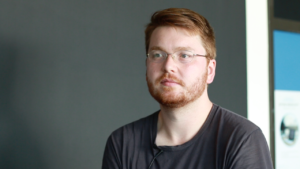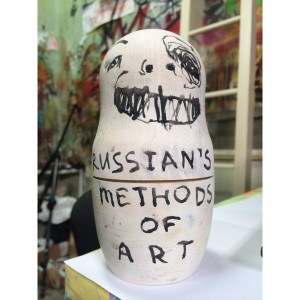The cycles of production of my projects are extremely long and they overlap temporarily. If you imagine a time line: project 1 starts here, project 2 here, project 3, there, here begins project 5. My projects usually happen parallel. And then usually before the premiere there is always a period in which the other projects are put on hold. After that, there are two months for the projects to be completed. This is very tiring but at the same time I work in a very accumulating manner. For the Moscow Trials, I kept going to Moscow for two years – again and again. I wouldn’t know what I am talking about otherwise. So you can only make my projects, if you have a network, if you know the people, if you really know what you are talking about, if you have a space and location, if it is relevant what you do. Therefore, I need a very, very, long time. Parallel to these let’s say substantial research driven processes there are external processes, the castings which usually happen a year before the production starts. When projects are finished, they often actually continue to run. It’s difficult to tell when they are completely finished. For example, Hate Radio had its premiere two and a half years ago, I guess. The book is about to be released. The cinema or television movie will be presented next year. There are several radio plays – the fourth one, I think. So there are always different adaptions. I carry these pieces with me for quite a long time and modify them again and again.
There are actually two types of projects for me. Some accompany my life for a very long time. For example, the project about the last days of the Ceausescu. There were television images, I had seen a child in 1989 during the fall of the wall that deeply impressed me. Ever since, I knew that I wanted to work with it one day. And when 2009 came closer, I proposed to simultaneously record and broadcast the trial. Of course no station wanted to do that. Then I produced it in the theater. Then there are other projects that actually start as simple tasks. For example I had been to the art festival in Brussels with The Moscow Trials two years ago, with ‚Hate Radio‘ and so on. Anyway, they asked me: Do you want to do something? And I said: Yes, I want to do something about the Syria conflict but now that I am working in Brussels, I noticed that it makes no sense at all to do it. And now I do something about Salafists and right-wing extremists in Brussels, or let’s say in Belgium, about the disintegration in Belgium. It’s kind of a replica of Griffith’s Birth of a Nation — Death of a Nation. This evolved during the production. I am forced to make decisions parallel to the production. So, you set up a casting. You invite every actor of Belgium. And then you have to choose actors and by this decision the project changes. I usually work the other way around: I need five actors. One has to look like Ceausescu, one would need to look like his wife, one like the judge, they must have this age, they need to speak this language and then everyone else will be cast and this is how the concept fills up. And the third type – perhaps it’s something like the The Moscow Trials. I was very enthusiastic about Bukharin, the main victim under Stalin and I had always wanted to do a project that is simply titled: The Moscow Trials. That’s why I went to Moscow. The National Theater ask me if I could do something about the Gulag and whether that was fitting. It started with the thirties and I ended up with today. I started with the idea of enacting the second trial of Bukharin, but eventually ended up in a new trial that deals with contemporary judicial cases. And so the process is actually completely different every time. Therefore, I believe it is important for me that I work in a team, with a set designer, with actors, with a production staff, knowing that it is possible that I cast five people in an incredibly exhausting process and in the end we don’t need them because we find someone who we meet on the street. Something like that can happen.
Die Produktionszyklen meiner Projekte sind extrem lang und sie überlagern sich gegenseitig. Wenn man sich das als Schema vorstellt, dann fängt hier Projekt 1 an, hier fängt Projekt 2 an, hier fängt Projekt 4 an, hier fängt Projekt 5 an. Die Projekte laufen immer parallel. Und dann gibt es immer eine Phase, die ist meistens vor der Premiere, wo das eine Projekt dann frei gestellt wird. Und dann gibt es zwei Monate, in denen die Projekte fertig gestellt werden. Das ist sehr anstrengend, aber gleichzeitig arbeite ich sehr kumulativ. Für die Moskauer Prozesse bin ich zweieinhalb Jahre nach Moskau gefahren. Immer wieder. Ich habe sonst keine Ahnung wovon ich spreche. Also man kann meine Projekte wirklich nur machen, wenn man ein Netzwerk hat, wenn man die Leute kennt, wenn man wirklich auch weiß wovon man spricht, wenn man einen Ort hat, wenn das relevant ist was man tut. Ich brauche deshalb immer sehr, sehr lange. Parallel laufen zu diesen quasi inhaltlichen Prozessen laufen die äußeren Prozesse also Castings, die sind ja meistens ein Jahr vorher, also bevor es dann produziert wird. Wenn Projekte fertig sind, laufen sie aber eigentlich auch noch weiter. Drum ist es schwierig zu sagen wann sie fertig sind. Also beispielsweise hatte das Theaterstück von Hate Radio vor zweieinhalb Jahren Premiere glaube ich. Das Buch kommt jetzt raus. Der Kino- beziehungsweise der Fernsehfilm kommt nächstes Jahr. Dann gibt es auch verschiedene Hörspiele. Mittlerweile schon das vierte. Also gibt es immer wieder verschiedene Bearbeitungen. Ich trage solche Stoffe immer ziemliche lange mit mir herum und mache sie immer wieder anders nochmal neu oder noch mal anders. Bei mir gibt es eigentlich zwei Arten wie ein Projekt entsteht. Das eine ist etwas das in mir angelegt seit sehr langer Zeit. Zum Beispiel das Projekt über die letzten Tage der Ceausescus. Das waren Fernsehbilder – dieses Prozesses, die ich als Kind gesehen habe, als 1989 die Wende war. Die haben mich extrem tief beeindruckt. Seitdem wusste ich, dass ich damit mal arbeiten möchte. Und als sich 2009 näherte, hatte ich ursprünglich einem Fernsehsender vorgeschlagen, sodass wir genau gleichzeitig zum Prozess live aufzeichnen und ausstrahlen. Das wollte natürlich kein Fernsehsender machen. Dann hab ich es im Theater produziert. Dann gibt es andere Projekte, die tatsächlich als Auftrag anfangen. Zum Beispiel bei diesem Kunstfestival in Brüssel. Da war ich vor einem Jahr mit den Moskauer Prozessen, vor zwei Jahren war ich glaube ich mit Hate Radio da und so weiter. Und die haben mich wieder gefragt: Willst du was machen? Und ich hab gesagt: Ja, ich würde gern was über die Syrienkämpfer machen. Aber jetzt wo ich in Brüssel arbeite, habe ich gemerkt, dass es überhaupt keinen Sinn macht, das dort zu machen. Und jetzt mache ich was über Satanisten und Rechtsradikale in Brüssel oder sagen wir in Belgien. Und über den Zerfall Belgiens. Also als Replik auf auf Griffiths’ „Birthe of a Nation“ Und das kam eigentlich in der Produktion. Und dann bin ich durch die Produktionsschritte gezwungen Entscheidungen zu fällen. Also macht man ein Casting? Lädt alle Schauspieler Belgiens ein. Und dann muss man sich entscheiden für Schauspieler und durch die Entscheidung für Schauspieler modelliert sich eigentlich das Projekt. Während ich teilweise ja wie gesagt von der komplett anderen Seite arbeite, indem ich hergehe und sage: ich brauche fünf Darsteller, einer muss so aussehen wie Ceausescu, eine muss, so aussehen wie seine Ehefrau, einer muss aussehen wie sein Richter, sie müssen dieses Alter haben, sie müssen diese Sprache sprechen und dann werden die Leute einfach gecastet und so wird das Konzept eigentlich gefüllt. Also ist das hier ein komplett anderer Vorgang. Und der dritte Vorgang ist vielleicht so etwas wie die Moskauer Prozesse. Ich war immer sehr begeistert von Bucharin, dem Hauptopfer unter Stalin. Und ich wollte immer ein Projekt machen, das einfach den Titel trägt: Die Moskauer Prozesse. Und deshalb bin ich nach Moskau gefahren. Also das Nationaltheater hatte mich dann gefragt, ob ich etwas für den Gulag mache und das hat dann irgendwie gepasst. Und da habe ich angefangen mit den dreißiger Jahren und beim Schluss bin ich heute gelandet. Da hab ich angefangen mit der Idee den zweiten Prozess tatsächlich zu re-inszenieren und bin dann in einem neuen Prozess gelandet, der über Justizfälle von heute handelt. Und so ist der Weg eigentlich jedes Mal ein ganz anderer. Und ich glaube deshalb ist es für mich auch wichtig, dass ich mit einem Team, mit einem Bühnenbildner, auch mit Schauspielern und einem Produktionsstab, die wissen, dass es möglich ist, dass ich fünf Leute caste in einem unglaublich anstrengendem Verfahren und am Schluss brauchen wir keinen von diesen fünf. Sondern jemand Anderen, den wir vielleicht zufällig irgendwo treffen. Also das kann passieren.

















